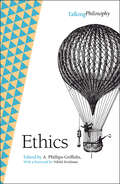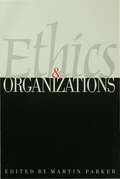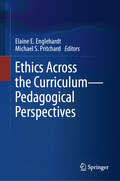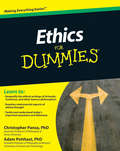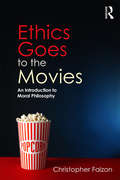- Table View
- List View
Ethics
by A. Phillips-Griffiths Nikhil KrishnanEthical questions are often associated with practical dilemmas: questions in morality, in other words. This volume, by contrast, asks questions about morality: what it is, and to what it owes its precarious authority over us. The focus on metaethics is sustained throughout, via a wide range of philosophical perspectives. Distinguished luminaries who include R. M. Hare and Bernard Williams address keenly debated issues such as what constitutes morality in politics; the relationship between education and ethical standards; and whether or not morality can indeed be defined at all. As Nikhil Krishnan writes in his elegant Foreword, 'The plain-speaking, essayistic grace of these essays, speaks nevertheless of the possibility of moral philosophy, written with an eye to a listener, very possibly not a professional philosopher, who has the right to say, ''This is all very well, your neat little theory, but it doesn't ring true. Things are more complicated than that.'''
Ethics
by Alain Badiou Peter HallwardAlain Badiou, one of the most powerful voices in contemporary French philosophy, shows how our prevailing ethical principles serve ultimately to reinforce an ideology of the status quo and fail to provide a framework for an effective understanding of the concept of evil.
Ethics
by Julia DriverEthics: The Fundamentals explores core ideas and arguments in moral theory by introducing students to different philosophical approaches to ethics, including virtue ethics, Kantian ethics, divine command theory, and feminist ethics. The first volume in the new Fundamentals of Philosophy series. Presents lively, real-world examples and thoughtful discussion of key moral philosophers and their ideas. Constitutes an excellent resource for readers coming to the subject of ethics for the first time.
Ethics & Law for Australian Nurses
by Kim Atkins Sheryl De Lacey Bonnie Britton Kim Atkins Sheryl de LaceyNursing is a profession that encompasses a huge diversity of practices and practice settings, but the aim of nursing practice remains the same: to support and promote the health and well-being of human persons. Ethics and Law for Australian Nurses is an integrated and coherent textbook that allows students to understand the mutual relationship between the legal and ethical frameworks of nursing practice. The text considers two key concepts to understanding the relation of ethics and law to the practice of nursing: the idea of human vulnerability and respect for persons. Through understanding ethics and law in terms of vulnerability and respect, this text provides a fresh understanding of the ethical and legal aspects of committing and witnessing errors in nursing practice. Many varied case studies and practical examples are used throughout to aid students' understanding of the ethical and legal responsibilities of nurses.
Ethics & Organizations
by Martin ParkerEthics and Organization provides a rich and valuable overview of an increasingly important issue for management and organizations in contemporary society. Debates about equal opportunities, environmental responsibility, consumer redress and corporate governance have given ethics a prominent place in the study of organizations in their social and natural environments. Within the organization, new management styles that seek to energize employees by manipulating their beliefs have highlighted the moral-ethical principles at issue in contemporary management. At the same time debates around postmodernism and relativism have moved ethics to a new centrality in contemporary social theory. Ethics and Organization addresses the questions that these and other developments raise for the study of management and organizations, from a multidisciplinary perspective. The book will be of value to advanced level students and academics engaged in analyzing the moral, political and ethical dimensions of organization theory and organizational practice.
Ethics (Dietrich Bonhoeffer Works)
by Dietrich BonhoefferFrom one of the most important theologians of the twentieth century, Ethics is the seminal reinterpretation of the role of Christianity in the modern, secularized world.The Christian does not live in a vacuum, says the author, but in a world of government, politics, labor, and marriage. Hence, Christian ethics cannot exist in a vacuum; what the Christian needs, claims Dietrich Bonhoeffer, is concrete instruction in a concrete situation. Although the author died before completing his work, this book is recognized as a major contribution to Christian ethics. The root and ground of Christian ethics, the author says, is the reality of God as revealed in Jesus Christ. This reality is not manifest in the Church as distinct from the secular world; such a juxtaposition of two separate spheres, Bonhoeffer insists, is a denial of God’s having reconciled the whole world to himself in Christ. On the contrary, God’s commandment is to be found and known in the Church, the family, labor, and government. His commandment permits man to live as man before God, in a world God made, with responsibility for the institutions of that world.
Ethics (Hackett Classics)
by René DescartesThough Descartes never wrote a book specifically devoted to moral philosophy, his thought on ethical matters can be found throughout his correspondence and in parts of his work Passions of the Soul. In 1685, an anonymous editor in London gathered these writings in a textbook devoted to Descartes&’s ethical thought. Roger Ariew has translated, from Descartes&’s original French texts, those selections included in the 1685 volume, adding to those writings an Appendix of relevant materials, including Part III of the Discourse on Method on the provisional morals, a portion of the Preface to the French edition of the Principles of Philosophy on the &“tree&” of philosophy, and portions of additional letters that help to illuminate the background for the correspondence included in the 1685 volume. Ariew&’s insightful Introduction explains the contexts in which Descartes addressed ethical questions, the reasoning behind his reluctance to write specifically about moral issues, and the significance of what this collection of writings reveals.
Ethics 101: From Altruism and Utilitarianism to Bioethics and Political Ethics, an Exploration of the Concepts of Right and Wrong (Adams 101 Series)
by Brian BooneExplore the mysteries of morality and the concept of right and wrong with this accessible, engaging guide featuring basic facts along with an overview of modern-day issues ranging from business ethics and bioethics to political and social ethics.Ethics 101 offers an exciting look into the history of moral principles that dictate human behavior. Unlike traditional textbooks that overwhelm, this easy-to-read guide presents the key concepts of ethics in fun, straightforward lessons and exercises featuring only the most important facts, theories, and ideas. Ethics 101 includes unique, accessible elements such as: -Explanations of the major moral philosophies including utilitarianism, deontology, virtue ethics, and eastern philosophers including Avicenna, Buddha, and Confucius. -Classic thought exercises including the trolley problem, the sorites paradox, and agency theory -Unique profiles of the greatest characters in moral philosophy -An explanation of modern applied ethics in bioethics, business ethics, political ethics, professional ethics, organizational ethics, and social ethics From Plato to Jean-Paul Sartre and utilitarianism to antirealism, Ethics 101 is jam-packed with enlightening information that you can&’t get anywhere else!
Ethics 101: What Every Leader Needs to Know
by John C. MaxwellBestselling author John C. Maxwell shows you how the Golden Rule works everywhere, and how, especially in business, it brings amazing dividends. Ethics 101 offers: Stories from history, business, government, and sports that illustrate how talented leaders invoked this timeless principle, Examples of difficult business decisions and how the Golden Rule applies to each, The five most common reasons people compromise their ethics, Case histories that prove how the Golden Rule builds morale, increases productivity, encourages teamwork, lowers employee turnover, and keeps clients coming back.
Ethics Across The Professions: A Reader For Professional Ethics
by Clancy Martin Robert C. Solomon Wayne VaughtThe most up-to-date reader with cases in professional ethics available.What does it mean to be an ethical professional? A professional career can be so demanding that it permeates every aspect of a person's life and personality. In light of this fact, it is especially important for students who are planning to enter a chosen profession to understand its moral status,moral virtues, and possible moral pitfalls, so that they will be equipped to deal with the inevitable moral quandaries that they will encounter as professionals.The most up-to-date professional ethics reader available, Ethics Across the Professions analyzes the complex ethical issues that arise in such fields as engineering, finance, healthcare, journalism, and law. Featuring a wide array of both classic and contemporary sources, it ranges from works byAristotle and Kant to selections by Michael Bayles, Sissela Bok, Paul Ekman, and Thomas Nagel. Organized topically, the anthology covers what it means to be a professional, outlines several ethical models, and addresses key issues including deception in professional life, privacy, loyalty, socialwelfare, conflicts of interest, and self-regulation. The book includes detailed chapter introductions, several practical case studies at the end of each chapter, and provocative discussion questions on issues like "whistle-blowing," the Iraq War, educating illegal immigrant children, andadvertisements for pharmaceutical companies. Edited by three renowned ethicists, Ethics Across the Professions is especially suited for introductory professional ethics courses taught in philosophy departments as well as in nursing schools, business schools, and other professional programs.
Ethics Across the Curriculum—Pedagogical Perspectives
by Michael S. Pritchard Elaine E. EnglehardtThis book features articles by more than twenty experienced teachers of ethics who are committed to the idea that ethics can and should be taught virtually anywhere in the education curriculum. They explore a variety of ways in which this might best be done. Traditionally confined largely to programs in philosophy and religion, the teaching of ethics has in recent decades spread across the curriculum education. The contributors to this book discuss the rationale for supporting such efforts, the variety of challenges these efforts face, and the sorts of benefits faculty and students who participate in ethics across the curriculum endeavors can expect. An overriding theme of this book is that the teaching of ethics should not be restricted to one or two courses in philosophy or religion programs, but rather be addressed wherever relevant anywhere in the curriculum. For example, accredited engineering programs are expected to ensure that their students are introduced to the ethical dimensions of engineering. This can involve consideration of ethical issues within particular areas of engineering (e.g., civil, mechanical, electrical, chemical) as distinctive segments of certain courses (e.g., those that focus on design problems), or as a full semester course in ethics in engineering. Similar approaches can be taken in nursing, medicine, law, social work, psychology, accountancy, management, and so on. That is, some emphasis on ethics can be expected to be found in broad range of academic disciplines. However, many ethical issues require careful attention from the perspectives of several disciplines at once, and in ways that require their joining hands. Recognizing that adequately addressing many ethical issues may require the inclusion of perspectives from a variety of disciplines makes apparent the need for effective communication and reflection across disciplines, not simply within them. This, in turn, suggests that faculty and their students can benefit from special programs that are designed to include participants from a variety of disciplines. Such programs will be a central feature of this book. Although some differences might arise in how such issues might best be discussed across different parts of the curriculum, these discussions might be joined in ways that help students, faculty, administrators, and the wider public better appreciate their shared ethical ground.
Ethics After Aristotle
by Brad InwoodFrom the earliest times, philosophers and others have thought deeply about ethical questions. But it was Aristotle who founded ethics as a discipline with clear principles and well-defined boundaries. Ethics After Aristotle focuses on the reception of Aristotelian ethical thought in the Hellenistic and Roman worlds, underscoring the thinker's enduring influence on the philosophers who followed in his footsteps from 300 BCE to 200 CE. Beginning with Aristotle's student and collaborator Theophrastus, Brad Inwood traces the development of Aristotelian ethics up to the third-century Athenian philosopher Alexander of Aphrodisias. He shows that there was no monolithic tradition in the school, but a rich variety of moral theory. The philosophers of the Peripatetic school produced surprisingly varied theories in dialogue with other philosophical traditions, generating rich insight into human virtue and happiness. What unifies the different strands of thought--what makes them distinctively Aristotelian--is a form of ethical naturalism: that our knowledge of the good and virtuous life depends first on understanding our place in the natural world, and second on the exercise of our natural dispositions in distinctively human activities. What is now referred to as "virtue ethics," Inwood argues, is a less important part of Aristotle's legacy than the naturalistic approach Aristotle articulated and his philosophical descendants developed further. Offering a wide range of ways of thinking about ethics from an ancient perspective, Ethics After Aristotle is a penetrating study of how philosophy evolves in the wake of an unusually powerful and original thinker.
Ethics And Criminal Justice: An Introduction (Cambridge Applied Ethics Ser.)
by John KleinigThis textbook looks at the main ethical questions that confront the criminal justice system - legislature, law enforcement, courts, and corrections - and those who work within that system, especially police officers, prosecutors, defence lawyers, judges, juries, and prison officers. John Kleinig sets the issues in the context of a liberal democratic society and its ethical and legislative underpinnings, and illustrates them with a wide and international range of real-life case studies. Topics covered include discretion, capital punishment, terrorism, restorative justice, and re-entry. Kleinig's discussion is both philosophically acute and grounded in institutional realities, and will enable students to engage productively with the ethical questions which they encounter both now and in the future - whether as criminal justice professionals or as reflective citizens.
Ethics And Law For School Psychologists (Seventh Edition)
by Jacob Dawn M. Decker Susan Jacob Elizabeth Timmerman LuggThere are a number of excellent texts, journal articles, and book chapters on ethics in psychology, legal issues in school psychology, and special education law. However, in the late 1980s, the authors of the first edition of this book recognized a need for a single sourcebook on ethics and law specifically written to meet the unique needs of the psychologist in the school setting. Consequently, Ethics and Law for School Psychologists was written to provide up-to-date information on ethical principles and standards and law pertinent to the delivery of school psychological services.
Ethics And Professional Development For Addiction Counselors: Principles, Guidelines And Issues For Training, Licensing, Certification And Re-certification
by Marcus MottleyIn Ethics & Professional Development for Addiction Counselors, Dr. Marcus Mottley defines and clarifies a wide number of ethical issues and dilemmas involving conflicts of interest, boundary issues, confidentiality, professional behaviors and the core obligations, roles and responsibilities of addiction counselors. Addiction professionals who use this book will become highly aware of their own values, attitudes and behaviors and how these might impact their professional conduct and their relationships with clients. Counselors will also gain insights and get clarification on key topics such as documentation, self-disclosure, dual relationships, cultural competence and HIPAA guidelines. Ethics & Professional Development for Addiction Counselors is a concise manual that includes the twelve principles of ethics, eleven principles of professional development and key guidelines, issues and information that are part of the core knowledge requirements for the licensing, certification and re-certification of addiction counselors. Ethics & Professional Development is a precise, no fluff, get-right-to-the-point guide, reference and training manual for counselors, therapists, healthcare professionals and others interested in the field of addictions and the treatment of alcoholism and drug use.
Ethics And The Conduct Of Business
by John R. BoatrightEthics and the Conduct of Business, 6/eis a comprehensive and up-to-date discussion of the most prominent issues in the field of business ethics and the major positions and arguments on these issues. Numerous real-life examples and case studies are used throughout the book to increase understanding of issues, stimulate class discussion, and show the discussion's relevance to real-life business practice. The focus of Ethics and the Conduct of Business is primarily on ethical issues that corporate decision makers face in developing policies about employees, customers, and the general public. The positions on these issues and the arguments for them are taken from a wide variety of sources, including economics and the law.
Ethics During and After the Holocaust: In the Shadow of Birkenau
by John K. RothAbsent the overriding or moral sensibilities, if not the collapse or collaboration of ethical traditions, the Holocaust could not have happened. Its devastation may have deepened conviction that there is a crucial difference between right and wrong; its destruction may have renewed awareness about the importance of ethical standards and conduct. But Birkenau, the main killing center at Auschwitz, also continues to cast a disturbing shadow over basic beliefs concerning right and wrong, human rights, and the hope that human beings will learn from the past. This book explores those realities and the issues they contain. It does so not to discourage but to encourage, not to deepen darkness and despair but to face those realities honestly and in a way that can make post-Holocaust ethics more credible and realistic. The book's thesis is that nothing human, natural or divine guarantees respect for the ethical values and commitments that are most needed in contemporary human existence, but nothing is more important than our commitment to defend them, for they remain as fundamental as they are fragile, as precious as they are endangered.
Ethics For Dummies
by Christopher Panza Adam PotthastAn easy-to-grasp guide to addressing the principles of ethics and applying them to daily lifeHow do you define "good" versus "evil?" Do you know the difference between moral "truth" and moral relativity? Whether or not you know Aristotle from Hume, Ethics For Dummies will get you comfortable with the centuries-old study of ethical philosophy quickly and effectively!Ethics For Dummies is a practical, friendly guide that takes the headache out of the often-confusing subject of ethics. In plain English, it examines the controversial facets of ethical thought, explores the problem of evil, demystifies the writings and theories of such great thinkers through the ages as Aristotle, Confucius, Descartes, Kant, Nietzsche, and so much more.Provides the tools to tackle and understand today's important questions and ethical dilemmasShows you how to apply the concepts and theories of ethical philosophy to your everyday lifeOther title by Panza: Existentialism For DummiesWhether you're currently enrolled in an ethics course or are interested in living a good life but are vexed with ethical complexities, Ethics For Dummies has you covered!
Ethics Goes to the Movies: An Introduction To Moral Philosophy
by Christopher FalzonMovies hold a mirror up to us, portraying the complexities of human reality through their characters and stories. And they vividly illustrate moral theories that address questions about how we are to live and what sort of people we ought to be. In this book, Christopher Falzon uses movies to provide a rich survey of moral positions as they have emerged through history. These include the ethics of the ancient world, medieval ethics, Enlightenment and Kantian ethics, existentialist ethics and the ethics of the other. Each theory is explained in detail, using a number of examples from the book’s wide selection of movies. The discussion draws on a range of recent and not-so-recent films, from Hollywood blockbusters to art-house cinema.
Ethics Handbook For Energy Healing Practitioners
by David FeinsteinEthical principles are far more than mere rules or regulations - they are maps for bringing out your best as a caregiver and healer. Responding to a lack of articulated or standardized ethical guidelines for energy healing practitioners, David Feinstein, PhD, and Donna Eden developed a professional curriculum that has become one of the country's most successful and effective energy medicine certification programs. Now, this comprehensive, case-oriented guide allows veterans of the field and newcomers alike to work through a wide range of ethical dilemmas before they arise, helping you to prevent professional errors that could hurt you, your clients, and your practice.
Ethics In Pastoral Ministry
by Richard M. GulaIn a conversational style the author offers a theological-ethical framework for reflecting on the moral demands that arise from the professional exercise of the pastoral ministry.
Ethics In Psychology And The Mental Health Professions: Standards And Cases
by Patricia Keith-Spiegel Gerald KoocherMost mental health professionals and behavioral scientists enter the field with a strong desire to help others, but clinical practice and research endeavors often involve decision-making in the context of ethical ambiguity. Good intentions are important, but unfortunately, they do not always protect the practitioner and client from breaches in ethical conduct. Academics, researchers, and students also face a range of ethical challenges from the classroom to the laboratory. <p><p> The completely updated fourth edition of Ethics in Psychology and the Mental Health Professions considers many of the ethical questions and dilemmas that mental health professionals encounter in their everyday practice, research, and teaching. This classic text takes a practical approach to ethics, offering constructive means for preventing problems and recognizing, approaching, and resolving ethical predicaments. <p> Written in a highly readable and accessible style, this new edition retains the key features which have contributed to its popularity, now with over 700 case studies that provide illustrative guidance on a wide variety of topics. New material has been added relating to evolving ethical challenges posed by new case law, electronic records, social media, changes in psychological assessment practice, complex work settings, and ethical issues in addressing human differences and diversity. <p> This edition has been re-framed to include substantial content that extends beyond psychology, including counseling, marriage and family therapy, and social work. The case studies now address professionals in each of these fields, supporting interprofessional education and making the material even more applicable and accessible to a wide range of mental health providers and students-in-training.
Ethics In The Criminal Justice System
by Peter Johnstone Scott H. BelshawEthics in the Criminal Justice System
Ethics In The Fashion Industry
by V. Paulins Julie HilleryKnock-off designer handbags, shoplifting, sweatshop labor, provocative advertising, these are just a few examples of complex ethical issues in the fashion industry today. Ethics are about making good decisions, and in the fashion industry-where it is essential to work cooperatively with many different people-understanding ethics is key to being an honest, informed, and effective employee. Ethics in the Fashion Industry provides readers with the tools they need to develop and practice ethical decision-making skills. Introducing Ethics in the Fashion Industry STUDIO--an online tool for more effective study! ~Study smarter with self-quizzes featuring scored results and personalized study tips ~Practice your skills with integrated projects and case studies ~Challenge your skills with chapter review quizzes ~Access images of sample forms ~Redeeming the code inside this card will give you full access to the content previously contained on the DVD or CD packaged with this book This bundle includes Ethics in the Fashion Industry and Ethics in the Fashion Industry STUDIO Access Card.
